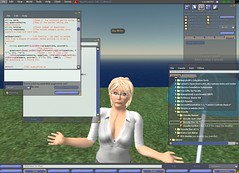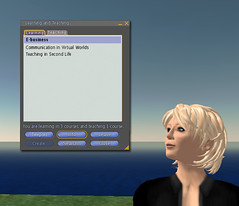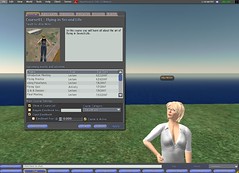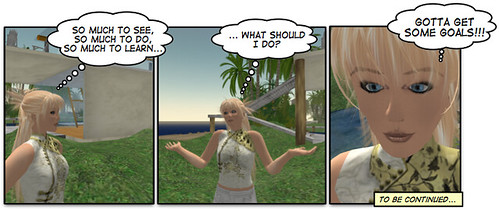 Yesterday was the last day of the Informing Science + Information Technology Education (InSITE) conference, organized by the Informing Science Institute and hosted by the Faculty of Economics in Ljubljana, Slovenia (yep, the city I live in - there's nothing better than having a good international conference at your doorstep ;) ). In the last 3 days I listen to around 25 presentations at the conference, and also presented my paper (yes, that is why I wasn't online as much as usually). How was it? Well, read below :)
Yesterday was the last day of the Informing Science + Information Technology Education (InSITE) conference, organized by the Informing Science Institute and hosted by the Faculty of Economics in Ljubljana, Slovenia (yep, the city I live in - there's nothing better than having a good international conference at your doorstep ;) ). In the last 3 days I listen to around 25 presentations at the conference, and also presented my paper (yes, that is why I wasn't online as much as usually). How was it? Well, read below :)I'd like to start by mentioning some of the presentations that I found most interesting and/or valuable (listed in order of appearance at the conference):
- The Search for the Adaptable ICT Student (Glen Van Der Vyver): This was a presentation of the results of a study among a group of undergraduate ICT students about their adaptability (which is one of the characteristics ICT students should have). The results showed that the students have a high degree of adaptability when personal choices are involved, but not much adaptability related to job change - students like change, but expect their jobs to adapt to their lifestyles, not the other way round. I find these findings really interesting, and I would certainly like to see how adaptable our students are.
- Advancing Sustainability of Open Educational Resources (Alex Koohang): I found this presentation interesting because it opened some interesting questions and issues related to Open Educational Resources and the sustainability of OER. These are all important topics in education, and I especially liked the fact that Alex stressed the importance of including users' perspectives in further research and development of OER.
- Of Disobedience, Divinations, Monsters and Fumbling: Adopting a Self-Service System (Bob Travica): During this presentation we learned about some of the issues that emerged during the adoption of a self-service management system in a Canadian company. The presentation got me thinking that we don't really pay enough attention to how our students adopt different e-learning systems, and that perhaps more detailed studies than just the usual multiple choice question "How would you grade the usability of the LMS?" should be performed. Mostly, we just have the quantitative data on how much our students like our e-learning systems, but I don't think we know enough about how they really interact with them, and about what could be done to improve their interactions with the system. Certainly a topic to keep in mind for further research.
- What Exactly Do You Want Me To Do? Analysis of a Criterion Referenced Assessment Project (Tony Jewels and Marilyn Ford): This presentation provided a critical view on criterion referenced assessment. They pointed out that the practice of using CRA shows different results than the theory of CRA predicts. In their paper, the authors presented some interesting negative feedback they got from their students when using CRA, which in neither surprising nor new. The authors concluded their study with a valuable suggestion: educational institutions should focus more on educating students at an early stage on skills that apply to all subjects and assignments.
- A ‘Hands on’ Strategy for Teaching Genetic Algorithms to Undergraduates (Anne Venables): I found this presentation inspiring because Anne presented an interesting approach to teaching what at first sight appears to be a complex and unattractive topic of genetic algorithms to undergraduate students in an engaging and easy to understand way using poppet beads. Sounds interesting? It sure is, so I really suggest reading Anne's paper that explains the approach in more detail. We definitely need more teachers like this in all our schools!
- To TxT or Not to TxT: That's the Puzzle (Val Hooper): During this presentation we heard about an interesting use of SMSes to engage large groups of first year students during lectures. I like the general idea of the presented SMS X-word puzzle activity (see the paper for a detailed description), and although it is at this moment still costly and technical demanding, I liked the fact that they've tried to engage their students in a new way that is closer to what the students use in their everyday life.
- The Educational Potential of Modified Video Games (Andrew Moshirnia): This presentation was a virtual one (meaning: we watched a PowerPoint presentation with a voice-over explanation of the author), so we weren't able to have a discussion with the author (which would certainly make the presentation even more interesting). Nevertheless, the presentation showed us an interesting example of using a Civilization IV mod to teach American Revolution. I still believe that we're at the very early stages of developing serious educational games, but I think it was good to have this topic presented at the conference.
- Using Video to Record Summary Lectures to Aid Students’ Revision (Janice Whatley): In this presentation we got an interesting example of using video lectures summaries with text notes to help students with course revisions. Although I like the general idea of these video summaries, I think it'd be better to give the students the ability to create their own video summaries and share them with their colleagues, or at least give the students the chance of posting and sharing their own notes for the video summaries. Still, the presentation did open some interesting questions about the usefulness and the right format of summary lectures, and I'm looking forward to seeing how this project will develop in the future.
 I also co-presented the paper Can Online Tutors Improve the Quality of E-learning?. You can check out the slides for the presentation on SlideShare, but I know there aren't of much use without the narration, so if you've missed the presentation and are interested about hearing more about the topic of the paper and the e-learning at my faculty, I can provide an on demand voice-over through Skype (my Skype ID: alja-skype) :)
I also co-presented the paper Can Online Tutors Improve the Quality of E-learning?. You can check out the slides for the presentation on SlideShare, but I know there aren't of much use without the narration, so if you've missed the presentation and are interested about hearing more about the topic of the paper and the e-learning at my faculty, I can provide an on demand voice-over through Skype (my Skype ID: alja-skype) :)Speaking of presentations: why is it so popular to share presenter notes with the audience through PowerPoint slides? I had the pleasure to listen to many great speakers at the conference, but unfortunately many of the interesting speeches were disturbed by great chunks of text behind their backs. I personally can't resist the temptation to read all the text on the slides. Unfortunately that turns my attention away from the speaker and the presentation becomes difficult to follow and to remember. A few minutes after such presentations I always wonder what the main point the presenter was trying to get across? And there is no way I can remember any of the slides. I really think these presentations would be better if the presenters turned off the projector and kept the slides full of text for themselves. If you don't have time to practice your presentation and prepare an interesting slideshow don't bother with using your notes on the overhead projector. And also getting all your notes on paper in advance really spoils a lot of the fun; I don't want to know how the story will end! Please, dear presenters: surprise me, engage me!
Apart from some bad uses of PowerPoint slides, the conference was full of interesting topics and presentations. I only wish I could have attended more, and talked to more people. Thanks to everyone that I met at the conference for all the interesting conversations we had, and I hope we can keep in touch. The next InSITE conference will take place at the nearly same date next year in Varna, Bulgaria, so we might meet again there.
Note: This is just an archive post. The blog has moved to a new home at blog.ialja.com, where you will also find a copy of the entire blog.





